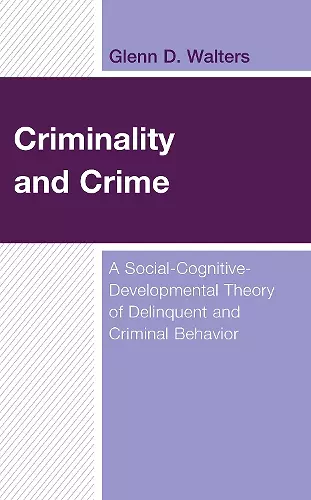Criminality and Crime
A Social-Cognitive-Developmental Theory of Delinquent and Criminal Behavior
Format:Hardback
Publisher:Bloomsbury Publishing PLC
Published:9th Mar '22
Currently unavailable, and unfortunately no date known when it will be back

Walters provides a detailed description of how criminal thinking serves as a vital link between criminality and crime. Criminality, the propensity to become involved in criminal activity, and crime, participation in a specific criminal event, are normally treated as separate entities. Most criminological theories, in fact, can be classified as either theories of criminality or theories of crime. It is the author’s contention that criminality and crime are two sides of the same coin, and that criminal thinking can explain both. The first of three sections explores the elements of criminality and crime across biological, social, cognitive, and developmental forms. The second section integrates the individual elements into three models using mediation and moderation methodologies. Two of the models are designed to explain criminality (moral and control) and the third is designed to explain crime (decision-making). The final section of the book emphasizes application and explains that change is a function of our ability to build competencies in offenders regardless of age. The result is an integrated approach in which criminality and crime are viewed as indispensable parts of a larger theory of criminological development.
Walters has already provided major contributions to our understanding of criminal thinking and decision-making. In this, the fourth of his books, he takes on one of his most ambitious tasks yet: integrating existing theories of offending in a developmental context. Anyone interested in a better understanding of crime, and individuals involved in committing it, would benefit from reading Criminality and Crime. -- Kirk Heilbrun, Drexel University
This well-researched and wide-ranging book puts forward numerous plausible explanations for the development of criminal propensity and the occurrence of criminal events, and also draws useful policy implications for the prevention of offenders and the reduction of crimes. Individual (e.g. empathy, self-control), environmental (e.g. parental, peer, neighborhood), biological, situational, and decision-making factors are all reviewed in detail and often illustrated in one particular case history. This stimulating book should be of great interest to all criminologists, psychologists, and social scientists who are interested in why offenders develop and why crimes are committed. -- David P. Farrington, Cambridge University
After his previous books where he theorized criminal thinking style and criminal lifestyle, Walters now ventures into treatment and specific treatment targets, showing that he is not only an outstanding theorist and empiricist, but that he is also committed to practice. Although he addresses very complex issues, his style is straightforward and devoid of jargon. A large audience will thus be able to benefit directly from the decades he has devoted to his Oeuvre. A must read! -- Martine Evans, Université de Reims
ISBN: 9781666904420
Dimensions: 238mm x 160mm x 25mm
Weight: 689g
318 pages